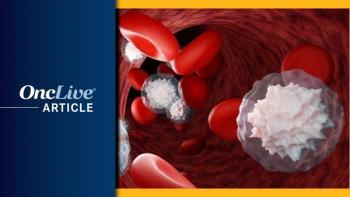
The Role of Ibrutinib in Follicular Lymphoma
Transcript:Shuo Ma, MD, PhD: Follicular lymphoma is a B-cell lymphoma that depends on the interaction of the malignant B-cells with the microenvironment. And many of those interactions were mediated by the B-cell receptor signaling, and also by the cytokine signaling pathways. Ibrutinib blocks the Bruton's tyrosine kinase, which is a critical player in the BCR pathway, as well as some of the cytokine pathways. So by blocking the BTK activity, ibrutinib can induce apoptosis in the lymphoma cells and also disrupt the interaction between the follicular lymphoma cells within the microenvironment.
Richard R. Furman, MD: In a phase II study looking at ibrutinib at 560 mg daily in patients with follicular lymphoma, Dr. Nancy Bartlett showed what looked like a very nice, overall response rate. But unfortunately, it seems that the progression-free survival is not as long as we would hope. And it certainly indicates to us that ibrutinib seems to be much more efficacious in CLL. We really need to understand more as to why ibrutinib's efficacy in follicular lymphoma is different.
Bruce D. Cheson, MD: Ibrutinib is a very exciting first-in-class Bruton’s tyrosine kinase inhibitor, which has been approved for the treatment of initially chronic lymphocytic leukemia. It has generated extraordinary enthusiasm because of a very high response rate in patients in the relapse setting, over 80%. And particularly because of its efficacy in the really bad actors, those with the 17p deletion, for whom prior progression-free survival curves were dreadful. And now, patients are living free of progression for several years with this drug.
There have been randomized trials in the relapse setting showing its dramatic superiority over chlorambucil, and in the frontline setting with some data. The RESONATE-2 trial that will be presented at this year's ASH meeting, is showing a very remarkable improvement in progression-free survival compared with chlorambucil in the frontline setting. It's also being combined with other drugs. One of the important studies, that's going on now, is being conducted by the US cooperative groups in older patients, and it is bendamustine/rituximab versus ibrutinib/rituximab versus ibrutinib-single agent.
The results of this study have the potential to revolutionize how we approach patients with chronic lymphocytic leukemia. It's a very exciting drug. It is well-tolerated. There are some problems in some patients with bleeding, the development of atrial fibrillation, some rash, and some arthralgia and fatigue. A lot of the side effects of the drug tend to dissipate over time. It's really revolutionized our approach to chronic lymphocytic leukemia.
Early on, Steve Trion, from the Dana Farber Cancer Institute, started testing this drug with good scientific rationale in patients with Waldenstrom's macroglobulinemia. And again, we're seeing responses in over 80% of patients. And as a result, the FDA approved, for the first time, a drug in Waldenstrom's, macroglobulinemia, that being, ibrutinib. It's well-tolerated and, again, it has revolutionized our management of this disease. In the past, we used alkylating agents and other drugs which have a number of substantial toxicities, both short term and long term. And now we have an oral targeted drug that gets better response rates. It's been great for patients with this disease.
Transcript Edited for Clarity



































